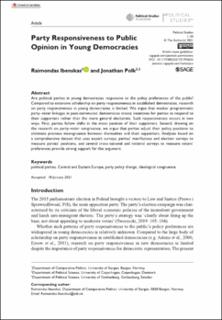Party Responsiveness to Public Opinion in Young Democracies
Journal article, Peer reviewed
Published version

Åpne
Permanent lenke
https://hdl.handle.net/11250/2982861Utgivelsesdato
2021Metadata
Vis full innførselSamlinger
- Department of Comparative Politics [516]
- Registrations from Cristin [10237]
Sammendrag
Are political parties in young democracies responsive to the policy preferences of the public? Compared to extensive scholarship on party responsiveness in established democracies, research on party responsiveness in young democracies is limited. We argue that weaker programmatic party–voter linkages in post-communist democracies create incentives for parties to respond to their supporters rather than the more general electorate. Such responsiveness occurs in two ways. First, parties follow shifts in the mean position of their supporters. Second, drawing on the research on party–voter congruence, we argue that parties adjust their policy positions to eliminate previous incongruence between themselves and their supporters. Analyses based on a comprehensive dataset that uses expert surveys, parties’ manifestoes and election surveys to measure parties’ positions, and several cross-national and national surveys to measure voters’ preferences provide strong support for this argument.
